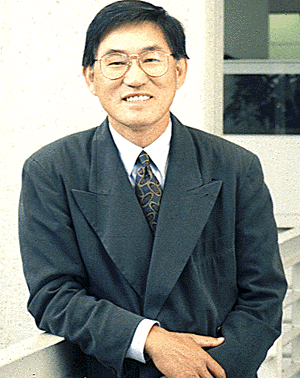|
GOLDSEA |
ASIAN AMERICAN RAGS-TO-RICHES SAGAS
RICHES FROM RAGS
PAGE 8 OF 15
Mow linked together five to ten thousand transistors to build
equipment capable of designing and testing logic chips, random access
memory (RAM) and micro-processors. He credits his machines with enabling
the birth of computer chip technology. "My equipment is now in the German
museum of Technology in Munich," he says proudly. Macrodata sold to
German and Japanese companies as well as 48 of the top 50 U.S. computer
companies. Two of Macrodata's biggest customers were IBM and NEC.
"We were undercapitalized," Mow says. "It was a typical hi-tech startup. The
moment it started to take off, we were in trouble." To pay down some of the
accumulated debt Macrodata made a public offering of 70% of its shares in
1972. Shares that Mow had bought for a penny apiece sold for $12 each. He
personally realized $360,000 from the offering, money he used to buy a
5-bedroom, 4,000-square-foot house on a one-acre lot in Woodland Hills.
A year later Macrodata needed more money. More shares were sold through
private placements. A large block was bought by Cutler-Hammer. Mow's
interest in Macrodata was now down to 10%. In 1976 Cutler-Hammer bought
up enough additional shares to control the company and brought in its own
executive to replace Mow as president. Mow as given the nominal title of
chief scientific officer and packed off with his secretary to an office in a
remote building. "I hoped they would call me," Mow says. "They never
did."
In retrospect Mow acknowledges that Cutler-Hammer had good reasons for
replacing him as CEO. "I was too busy with the technical side of things, which
I loved, and didn't pay enough attention to inventory and operations. I
wasn't a good manager. But they could have used my talents. I was the
company. They killed the goose that laid the golden egg."
Mow's pride left him little choice but to leave Macrodata. It took him years
of litigation before he got $1.1 million for his remaining 10% interest in
Macrodata. The amount seems positively paltry considering the company's
seminal role in the development of the modern computer industry. "Back in
1976 micro technology was just getting started," Mow explains. "Apple and
PCs weren't around yet. Also, a million seemed like a lot more money then
than $3 million does today."
Other minority shareholders also brought suits, alleging that Cutler-Hammer
had fraudulently undervalued their interests. When all was said and done,
Cutler-Hammer had paid $30 million for Macrodata. Over the next 10 years
the company lost another $100 million before going out of business.
Mow regrets having given in to the temptations of glamour and fast profits
promised by taking his brainchild public. He could have done things to make
the company more self-sustaining, he believes. "I was strongly influenced by
the investment bankers. I made the decision based more on immediate than
long-term considerations."
After Macrodata he had no desire to start another technology company. "I
had achieved the ultimate in the electronics industry. No one can surpass me
in the field of computer instrumentation. Once I had achieved that, I didn't
want to start something else that would compete with Macrodata."
Mow was a member of El Caballero Country Club in Tarzana. Some other
members with whom he played golf encouraged him to go into the garment
business. Mow started Dragon International in 1976 as an agency to import
garments and other merchandise for other companies. The next year his
factor (a type of finance company that routinely guarantees receivables in
the trading and garment industries) introduced him to Stanley ("Bucky")
Buchthal, a smooth-talking executive vice-president at A-Smile jean
company. Buchthal talked Mow into going into the pants business. "I had
invented machines with millions of wires that measured time to a billionth of
a second," Mow recalls. "I thought I could make a pair of pants."
The sway Buchthal enjoyed over Mow can be seen in the fact that not only
was Buchthal named the new company's president, he was also its namesake.
The company's original name "Buckaroo International" was derived from
Bucky, Buchthal's nickname. For a nominal $2,000 Buchthal got a 20%
interest in the company which Mow had capitalized with $200,000. "He was
supposed to be the garment industry guru," Mow says. Buchthal took charge
of sales and marketing while Mow worked at establishing cost-efficient Asian
suppliers through his Dragon International.
PAGE 9
PAGE 1 |
2 |
3 |
4 |
5 |
6 |
7 |
8 |
9 |
10 |
11 |
12 |
13 |
14 |
15
|
|
|
|

<
|
“I had invented machines with millions of wires that measured
time to a billionth of a second. I thought I could make a pair of pants.”
|
CONTACT US
|
ADVERTISING INFO
© 1996-2013 Asian Media Group Inc
No part of the contents of this site may be reproduced without prior written permission.
|







